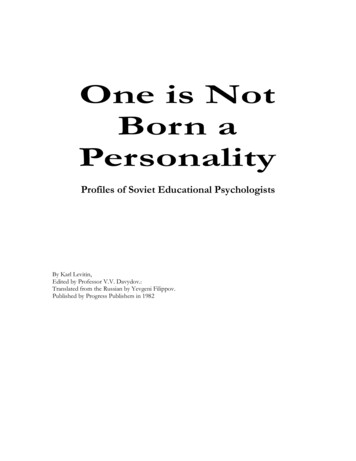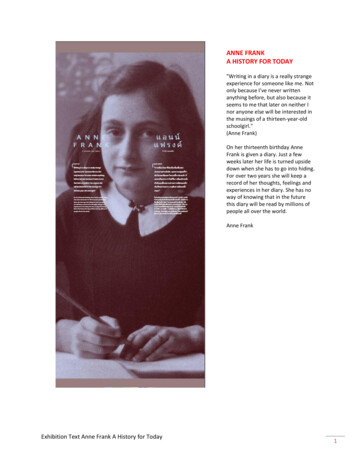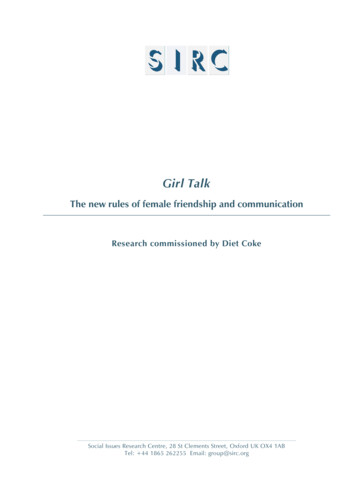
Transcription
One is NotBorn aPersonalityProfiles of Soviet Educational PsychologistsBy Karl Levitin,Edited by Professor V.V. Davydov.:Translated from the Russian by Yevgeni Filippov.Published by Progress Publishers in 1982
Table of ContentsPreface. 1From the Author . 5Chapter I “Ages and Days” Lev Vygotsky. A Biographical Profile. 7Semyon Dobkin’s Reminiscences. 11“The Mozart of Psychology” . 21Chapter II. “One Is Not Born a Personality” Alexei Leontiev. A Biographical Profile. 53“One is Not Born a Personality!” (An Interview with Alexei Leontiev).56Chapter III. “Always a Meaningful Pattern” Alexander Luria. A Biographical Profile. 67II. The Detective. 69From “A History of Psychology in Autobiography” . 81Chapter IV. “A Thinking Reed” Alexander Meshcheryakov. A Biographical Profile . 88“A Thinking Reed” (A Report on the Work of Alexander Meshcheryakov) . 91Digression one. . 98From the Works of Vygotsky .98From Meshcheryakov’s Book .98Davydov on Meshcheryakov’s “Awakening To Life” .98From Alexei Leontiev’s Speech at Moscow University .100From Bonifaty Kedrov’s Speech.103From Evald Ilyenkov’s Speech.103Digression Two .108From Sasha Suvorov’s New Year’s Letter to Olga Skorokhodova .108To the Rector of Moscow State University from Yuri Lerner .108From a Letter to the Komsomolskaya Pravda Newspaper.109From Natasha Korneyeva on “What I would Like to Be” .110Digression Three .114I.114II .118III.123Digression Four .130From a Book by AL Vinapra Ushev.130From an Article by Raisa Mareyeva .133Chapter V. Vasili Davydov. A Biographical Profile .145“Much Learning does Not Teach Understanding” .146In Lieu of an Afterword .154Brief Biographies of Soviet Psychologists .155
PrefaceLevitin’s book on psychologists is entitled One Is Not Born a Personality. Over thecenturies, philosophers, psychologists and educators have been trying to prove thatseemingly obvious proposition. All of them have been faced with misapprehension on thepart of laymen, scientists and even politicians. Psychological concepts are, in essence andorigin, understandable and familiar to everyone practically from early childhood. A child isadmonished and, less often, praised for its attention, memory, skills, attitudes, willpower, etc.Almost every adult prides himself on being a psychologist.In psychology more than in any other science, quotidian and scientific concepts areinterwoven. This breeds the illusion that psychology is simple and understandable to all.Psychologists have more reason than any other scientists to be wary of journalists makingforays into their domain, in particular into the “holy of holies” which has to do not only withexperiments and theoretical problems but also with the personalities of the scientiststhemselves. To me and many of my colleagues, most of the psychologists portrayed in thisbook are not just scientists. They are teachers’ teachers, our own teachers, colleagues andfriends – in short the people nearest and dearest to us. Some of them are still around; onecan learn from and argue with them, while others remain only in their works and in ourmemories. So I opened this book by Karl Levitin in a somewhat guarded mood, but wasvery grateful to the author upon reading it.I remember once Leontiev told me he was thinking of writing a book about Vygotsky.He was sure no one could do a better job than he. That may well have been so, but he nevergot around to writing it. Luria also wanted to write about Vygotsky, but he didn’t manage todo it. I would like to write a book about my psychologist father, Petr Zinchenko, about howhe worked, fought during the war, and taught. I wanted to write a book about Gorbov, oneof my teachers and a close friend. As it was, I had to confine myself to delivering a funerallecture on that remarkable man at Moscow University.Perhaps none of this is accidental. As they say, the cobbler’s children go without shoes,and the psychologist often finds it hard to write about people.This may be partly because to write about people who are near to you, you must be ableto look at them from a distance, which is not easy. But perhaps what is most needed is aspecial ability to see a person in his wholeness and complexity, whereas we psychologistsarrive at such an understanding only by the arduous path of analysis, schematisation andstudying the “anatomy of the spiritual organism.” So psychologists must grudgingly admitthat writers and journalists have an unquestioned advantage over them on that score.My main object in writing this preface is to attest to the truth of everything written inthis book. I can do so with some confidence because I literally grew up in the midst of theKharkov circle of psychologists and knew many of them personally before I ever heard theword psychology. Later the same people taught me psychology in Moscow. And I mustadmit that the eyewitness accounts and legends, as it were, which are handed down fromgeneration to generation, recorded here coincide with my own impressions and knowledge.Levitin has done a thorough job of collecting these oral accounts and studying the literature(and manuscripts) of those days to recapture the remarkable atmosphere of the early years ofSoviet psychology. It was actually a kind of Russian avant-garde movement in psychologywhich followed ten years after the avant-garde period in art. Most readers abroad think thatboth these instances of the avant-garde shared the same fate. Like any view, this one is also
2ONE IS NOT BORN A PERSONALITYerroneous in many ways yet it pinpoints something real. It is true that the discoveries ofSoviet psychology were very significant, and it is just as true that only now are people abroadbeginning to assess them objectively and correctly. But this assessment is a slow process, andthen, too, the assessments are tinged with incredulity. How could a science have beenformed and ideas decades ahead of their time been generated in such difficult circumstances,and in the face of biased criticism at that? True enough. Conditions were hard, there wereplenty of annoying distractions, hunger and unfair judgments; there was scientific andideological struggle. But there was also the joy, the exhilaration of pioneers. These peopleloved their country, their people and their science. They were genuine patriots; they thoughtnothing of fame and were not concerned with their reputations as thinkers.They were eager to lay the foundations of a Marxist psychology. And they did not want itserved to them on a silver platter – the root of many debates at the time – they wanted tobuild it themselves. Psychology developed not from theory but from practice in the youngSoviet land. Educational and child psychology and the study of the handicapped (Vygotsky),the treatment and study of identical twins (Luria), the concept-forming process inschoolchildren (Leontiev), the psychological aspects of the illustration of fairytales and thedevelopment of the child’s mentality (Zaporozhets), the way children master the simplesttools (Galperin), the development and shaping of memory in schoolchildren (Zinchenko) –this is but a random selection of the list of problems tackled by the team led by Vygotskyand, following his death, by Leontiev and Luria.For them, theory was a means and not an end. They were all anxious to make theircontributions to the great transformations taking place in the Soviet state, and theysucceeded. They did everything to ensure that psychology would contribute as much aspossible to these transformations and take a worthy place among the sciences. Speaking ofpractice, Vygotsky wrote: “The stone which the builders have neglected should be made thekeystone.” And this proved to be quite a valid approach: it led to a theory. Now, listening tothe members of the Kharkov school, and Vygotsky’s colleagues in Moscow and Leningrad,recalling the atmosphere of those years, one wishes one could have worked with them at thetime.They worked hard and with great élan. Making a name for themselves, furthering theircareers, and getting published were the farthest thoughts from their minds. By a quirk offate, Luria began his “career” by organising a journal in his undergraduate years, and wassubsequently appointed a member of the editorial board by Academician VladimirBekhterev. Vygotsky got his start publishing the works of Ilya Ehrenburg. Ten years later,they had produced such a large body of work that it would have been impossible to publishit all, they had a hard time finding a firm that would tackle the job. But science has a way ofproviding its own motivation and being its own reward, so they worked fervently for thesake of the future. They believed, as talented Soviet writer Mikhail Bulgakov would later say,that “manuscripts don’t burn.” And their manuscripts didn’t. They survived even the horrorsof the Nazi invasion and are still being published.Some psychologists have not been quite so forthcoming in publishing their works. Newtimes bring new songs. Perhaps the older scholars prefer that their fondest creations of yearspast remain unpublished for fear they might seem naive and unsophisticated. The truth is,however, that first scientific works, like first love, have a unique charm and a freshness ofvision verging on revelation. This may be why early works tell us more about thepersonalities of their authors. I am glad the author of this book has quoted from the earlyworks of the leading Soviet psychologists.
PREFACE3And now a few words about controversies and criticism. The psychological school ofVygotsky described in this book has never had any fear of either. Moreover, the adherents ofthe school criticised each other with a severity that would baffle an outsider. But they alwaysdid so with passionate conviction. I think that sets a good example for relationships within aschool of thought, an example many present-day mentors and pupils would do well toemulate. Like the author of the book, my memories tend to focus on the school of Vygotsky,Luria and Leontiev although this book is not only about their immediate pupils andcolleagues. Vygotsky’s school had a far-reaching influence on Soviet psychology andattracted many followers. For example, Meshcheryakov was a pupil of Luria, Zaporozhetsand Sokolyansky. I think it would be appropriate to note the main features of that scientificschool which is now widely known as the psychological theory of activity.1. The development of the psychological theory of activity in this country was not apassing fad but bade its time. The first unpublished work of Luria raises a voice of youthfulprotest against metaphysical psychology.2. The psychological theory of activity is the achievement of the whole of Sovietpsychological science. Vygotsky’s school shares the credit for it with some otherpsychological trends. Ananiev, Basov, Rubinstein, Smirnov, Teplov, Uznadze, and otherscome to mind, but Rubinstein’s contribution was by far the most important.3. The psychological theory of activity critically assimilated the achievements andexperience of psychology the world over.4. The psychological theory of activity has solid historical and philosophical precedentsand traditions which were expounded, with a view to psychological tasks, by psychologiststhemselves, notably by Vygotsky, Davydov, Leontiev and Rubinstein, as well as by manySoviet philosophers and methodologists, including Dienkov, Kopnin, Lektorsky, Ogurtsov,Shvyrev, and Yudin, to name but a few.5. The psychological theory of activity draws on a solid general scientific tradition, theassimilation of which is an important condition for its further development. One mightmention the theory of that remarkable evolutionist Alexei Severtsev, who regardedpsychology as a powerful factor in evolution. Then there are the achievements in physiologyof the brain, study of the sense organs, and the appendages contained in the works ofSechenov, Sherrington, Vvedensky, Ukhtomsky, Pavlov, and Bernstein. Zaporozhets, Luriaand many others proceeded from their initial studies.6. The psychological theory of activity has deep roots and traditions in the humanitiesand the arts. These traditions are only partially elaborated in the works of Vygotsky, Elkoninand Leontiev. Further work in that direction is highly topical. Psychologists have yet tomaster the scientific legacy of Mikhail Bakhtin, Paul Valeri, Alexei Losev and many others.7. The psychological theory of activity in its original and present form is intimately linkedto applied psychology. There is a constant exchange of ideas, methods and results betweenthe theory and its practical application. In a number of fields of psychology this theory hasbecome highly operative in the true sense of that word.8. The main points of the psychological theory of activity have been reflected in virtuallyall fields of psychology, so quite naturally it is often described as general psychologicaltheory.9. The psychological theory of activity is not yet complete in every detail. Like any livingtheory, it is still developing and does not fear contradictions.
4ONE IS NOT BORN A PERSONALITYElaborating the above theses would take a book as large as Levitin’s. I feel, however, thatthe author approaches his subject matter in an interesting way and gives superb illustrationsin many cases even if he does not always argue the point to the end.I wish I could say more about the work of Vygotsky and his pupils and associates all ofwhich has had a great impact on the development of psychology throughout the world. Byand large, however, Levitin’s book succeeds in getting that message across. And anyway, Ithink it is best to allow the reader to judge for himself.I know that a preface is supposed to describe the book and say something about itsauthor, but I found myself writing about something else. And perhaps it is for the best as Iam sure that the reader will be able to judge the work on its own merits. The important thingfor me is that this exhaustive study has evoked pleasant memories about people who wereclose to me and has provoked some thoughts. I hope that readers abroad will welcome thisexcellent opportunity to get an inside look at what has been done by the psychologists in ourcountry. Working as a scientist is always a hard way of earning a living. Scientists deal inwords, but they understand the aphorism of that remarkable Russian poet OsipMandelshtam who said that the word can be flesh and bread can be joy.Professor Vladimir Zinchenko,Moscow State University
From the AuthorThe fate of this book was finally sealed in the autumn of 1979 in Tbilisi where aninternational symposium on unconscious psychological activity was being held. Severalhundred scientists from all over the world, including many psychologists from this country,had gathered in the capital of Soviet Georgia. Some very familiar and very necessary voiceswere conspicuously absent from among the multilingual chorus. In the late seventies, Sovietpsychology suffered several irreparable losses, including the deaths of Luria and Leontiev.These two thinkers differed from each other, yet they were united by their association withLev Vygotsky, the man who directed their scientific efforts. Pupils and colleagues ofVygotsky, they themselves had fostered a following, and some of their followers werepresent at the international forum in Tbilisi. They were joined by the invisible threads of acommon theoretical foundation and a general style of psychological thought coming fromthe same school, that of Vygotsky, perhaps the most promising one in contemporarypsychology.It so happened that I was able to observe the activity of many of these people over aperiod of years. During all this time, tape-recordings, notebooks with sketches, and piecesthat were almost complete were accumulating in my files waiting to be put together into abook. But for that to happen, two things were necessary: an initial impetus and documentedinformation on the life and thoughts of Lev Vygotsky before the memorable year of 1924when that obscure teacher from Gomel became, almost overnight, one of the major Sovietpsychologists.Well, the stimulus was provided by the symposium because the themes it discussed wererelated to those which were debated in the early “Vygotsky” years, and in the three fatvolumes of reports presented at the symposium, I found several dozen references to theworks of Vygotsky. A further stimulus was my talk with Roman Jackobson who shared hisreminiscences with me about Alexander Luria, the most loyal, consistent, devoted, and –although it may seem an odd word to use – the most tender pupil of Lev Vygotsky.In Tbilisi, I ran into a man who had been a friend of Vygotsky in his little known youthin Gomel. Let me explain. In Tbilisi, I met a doctor of medicine by the name of Feigenbergwho presented an interesting paper on the principle of complementarity in psychology. Hismother was from Gomel and, as it turned out, her family and the Vygotsky’s were veryfriendly. When we got back to Moscow, Feigenberg arranged for me to meet his mother’sbrother, Semyon Dobkin, who was a friend of Vygotsky when they were young. Dobkin’sreminiscences filled in the gap and enabled me to connect everything I had heard, read andthought about Vygotsky and his school in recent years into a coherent picture. And so thisbook saw the light of day.As the reader will see, the bulk of it consists of my records of the meetings and talks withits protagonists, the leading Soviet psychologists. Their kindness and sympathy wereinvaluable to me in collecting and sorting out the material on the work of this interesting andproductive school in Soviet psychology, the school of Vygotsky. To my deepest regret, mostof them are no longer with us, so I cannot address my sincere thanks to them personally.The contribution of the editors in making the book clear and coherent could only beappreciated by someone who had seen the original manuscripts. I am grateful to them fortheir tremendous efforts. I benefited enormously from the advice of Professor Petrovskyand the critical advice of Professor Zinchenko. I received great help in working on the book
6ONE IS NOT BORN A PERSONALITYfrom Yelena Luria, the daughter of the late Professor Luria who has preserved and put herfather’s archives in order.I chose the kind of narration for this book that will enable me to tell, if only briefly,about many Soviet psychologists who were in one way or another involved in the emergenceand development of the Vygotsky school. At the same time, I have been careful to take aretrospective view of things and to keep my perspective. This is the reason for the fivechapters which are very different in form and content, but which I hope add up to acoherent picture. I have treated the archive materials, transcripts of talks and publicationsaccurately. But don’t expect to find literal or direct quotations in this book: after all, the spiritis almost always more important than the letter.Karl LevitinMoscow, 1980
Chapter I “Ages and Days”Lev Vygotsky. A Biographical ProfileThe mechanism of cognition of oneself (self-consciousness) and cognition of others isidentical. Traditional theories for understanding the psyche of others proceed eitherfrom direct claims that it is unknowable or from a hypothesis of one kind or anotherwhich seeks to build a plausible mechanism which is essentially the same in the theoryof sensation and in the theory of analogies: we learn about others inasmuch as welearn about ourselves; by learning the anger of others I reproduce my own.Actually, the reverse is nearer the truth. We are conscious of ourselves because we areconscious of others, and by the same token as we are conscious of others, because weare to ourselves what others are to us.Lev VygotskyLev Vygotsky, an outstanding Soviet psychologist, was born on 5 November 1896 in thetown of Orsha not far from Minsk, the capital of Byelorussia. He finished the gymnasium inthe city of Gomel in 1913 and entered Moscow University. In 1917, after receiving a lawdegree and taking a course in psychology and philosophy at the People’s University ofShanyavsky, he returned to Gomel to teach literature and psychology at the school there. Healso conducted classes at a drama studio and often delivered lectures on literature andscience. At about the same time, he organised a psychology laboratory at the GomelTeacher’s College. There he delivered a course of lectures which later became a book calledEducational Psychology.Vygotsky began his work in Moscow in 1924, first at the Institute of Psychology andthen at the Institute for the Study of the Handicapped. During the same period, he headedthe department for the education of mentally and physically handicapped children atNarkompros (People’s Commissariat for Education) and taught at the Krupskaya Academyof Communist Education and at the Institute of Education in Leningrad. During that period,Vygotsky gathered many young researchers working around him in the field of psychologyand the study of the handicapped. Most of these followers are prominent Soviet scientiststoday.All in all, Vygotsky wrote 200 scientific works. His major published works include:Consciousness As a Behavioural Problem (1925), Educational Psychology (1926), The Development ofVoluntary Attention in Childhood (1929), Essays in the History of Behaviour (jointly with Luria)(1930), Thought and Speech (1934), Selected Psychological Studies (1956), The Development of HigherPsychic Functions (1960), The Psychology of Art (1965; second enlarged edition, 1968). The SovietPedagogika Publishing House is currently preparing a six-volume collection of Vygotsky’sworks.In his later years, Vygotsky was interested in the medical aspects of his psychologicalinvestigations. This led him, already a full professor, to enter the Medical Institute as anundergraduate first in Moscow and then in Kharkov. During his visits to Kharkov to take hisundergraduate examinations, Vygotsky simultaneously delivered a series of lectures onpsychology at the Ukrainian Psychoneurological Academy. Shortly before his death,Vygotsky was offered the position of head of the Psychology Department at the NationalInstitute of Experimental Medicine.Vygotsky died of tuberculosis on 11 June 1934 at the age of thirty-seven.The life of Lev Vygotsky was not too eventful but it was full of inner content. Hissearches were adventures of the spirit.
8ONE IS NOT BORN A PERSONALITYNow from a distance of more than half a century his short life appears somewhatdifferent. A perceptive psychologist, an accomplished student of the arts, a talented teacher,a great connoisseur of literature, a brilliant stylist, a penetrating researcher in the study of thehandicapped, an imaginative experimentalist, a thoughtful theorist – certainly he was all thesethings. But above all he was a thinker.“Lev Vygotsky undoubtedly occupies an exceptional place in the history of Sovietpsychology. It was he who laid the foundations for its further development and determinedits present state in many respects . There is hardly an area of psychology to which Vygotskydid not make an important contribution. The psychology of art, general psychology,developmental psychology, and psychology of education, the study of handicapped children,patho- and neuropsychology – he infused new energy into all these areas.” Thus wrote thejournal Voprosy Psikhologii (Questions of Psychology) in 1976 in an article marking Vygotsky’s80th anniversary.It is difficult to believe that these words refer to a person who devoted a little over tenyears of his life to psychology, and that after hard years darkened by a debilitating diseasewhich eventually took his life. Then there were the everyday difficulties which distracted himfrom his work and thoughts, and he had to cope with the lack of attentiveness andmisunderstandings of others which sapped his strength and hurt him. Moreover, problemsof psychology was not his sole interest. Other passions, sometimes far removed, also fellwithin his intellectual purview.“I don’t think there was any period in his life when he did not think or write about thetheatre,” I was told by Vygotsky’s sister Zinaida, who was quite attached to him and felt bothan emotional and an intellectual kinship. She was well aware of his concerns, joys andsorrows. “Literature, especially his favourite poetry, always gave him much solace in life andalways engaged his attention,” recalls Semyon Dobkin, a friend of his childhood and youth.Georgy Schedrovitsky, a prominent Soviet methodologist with a special interest in thehistory of psychology, believes that the strength of Vygotsky was precisely this: he was not aprofessional psychologist and so from the start was free of the limitations of any of thedominant schools of the time. I think one could go along with that view but with theessential reservation that the underlying basis of all his concepts was the Marxist philosophyto which he pledged fealty.It is interesting to recall the opinion of Stephen Toulmin, Professor of Social Thoughtand Philosophy at the University of Chicago:“.It is just this general theoretical orientation toward history and culture that hasenabled Soviet behavioural scientists to achieve the level of interdisciplinarycollaboration and intellectual integration they have. In particular, it was an earlyexposure to Marxian historical thinking that enabled Vygotsky himself to tacklethe problems of child development in his own original way . And, in studyingthese processes, Vygotsky and his successors were only helped by having startedout from a ‘historical materialist’ position.“That being so, it should be evident that Vygotsky’s and Luria’s . respectfulreferences to Marx and Engels . represent something more than . political lipservice. This is something that even Vygotsky’s Western admirers have not alwaysunderstood.“Vygotsky was more than happy to call himself a Marxist . The general frameprovided by a ‘historical materialist’ philosophy gave him the basis he needed fordeveloping an integrated account of the relations between developmental
LEV VYGOTSKY. A BIOGRAPHICAL PROFILE9psychology and clinical neurology, cultural anthropology and the psychology of art– an account that we in the West can afford to take very seriously today. This hadnothing to do with the demands of ideological conformity .“If we are to assess the work of the Soviet psychologists fairly, or judge the truetheoretical relevance of historical materialism to theories of human behaviour anddevelopment, we must therefore take care not to be distracted by our politicalattitudes toward the government of the USSR. Otherwise, we shall make the samemistake the early nineteenth-century British anatomists and physicians made whenthey denounced French physiology as ‘atheistical’. It will then be we ourselves, notVygotsky and Luria, who are the ideologues.”I have quoted at length because this quotation pinpoints the main motive force ofVygotsky’s work. The categories of dialectical and historical materialism run through all hiswork. To take just one of a hundred possible instances, here is an extract from his discourseon the role of the word which reveals his profound understanding of the law of “negation ofthe negation,” and awareness of the dialectical nature of any process in constantdevelopment, and of the “swapping” functions of word and action:“We cannot settle either for Goet
however, that first scientific works, like first love, have a unique charm and a freshness of vision verging on revelation. This may be why early works tell us more about the personalities of their authors











